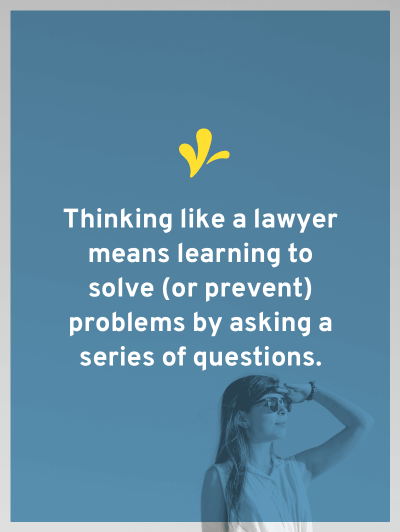I’m going to let you in on a little secret: I spend a big chunk of my day day-dreaming.
How to “think like a lawyer”
The biggest skill that you learn in law school is “how to think like a lawyer.” Thinking like a lawyer does not mean learning how to be an argumentative jerk. Believe me, there are plenty of those who never step foot in a law school classroom (and several who do).
 Thinking like a lawyer means learning to solve (or prevent) problems by asking a series of questions. The exact questions vary depending on the situation, but there are some consistent themes.
Thinking like a lawyer means learning to solve (or prevent) problems by asking a series of questions. The exact questions vary depending on the situation, but there are some consistent themes.
- What rules (laws) might apply to this situation?
- What are the general issues that could arise in this situation?
- Are there any specific facts or details that if varied might change the outcome of the situation?
- What happens when I stand in the other person’s shoes?
- Where specifically did things go wrong?
- Where specifically could things go wrong?
Thinking like a lawyer means learning to solve (or prevent) problems by asking a series of questions.
As current and former law students know, you can take this line of thinking too far. For example, thanks to the time that I saw a well-dressed man peeing on a building, I now worry about people peeing in my bike helmet and know which intentional torts someone might be committing by doing so. (And yes, this exact scenario was a recent Facebook discussion among some of my friends.)
Now that I’m practicing law, I spend a good chunk of my time daydreaming and applying these principles to my client’s situations.
I use my research, memory bank, and imagination to come up with worst case scenarios, determine what details matter, what the other side might be thinking, and figuring out how we can put contingencies in place to prevent problems.
Ready to Collaborate?
Say the two of us decide to collaborate on a project. I am going to take photographs, give you prints, and you are going to add to the prints. If we are going to examine this situation like a lawyer, we start by thinking about situations that have arisen in our previous experiences, in our friends’ experiences, and imagining worst-case scenarios.
We might ask ourselves:
- How is credit given?
- What happens if we start to hate each other?
- What happens if a bus hits one of us?
- What if you have a kid, move to Marin, and only want to work one day a week?
- Can I later license the photograph without your additions to Anthropologie? If I can, do I have to pay you part of the money I get?
- Do we reimburse each other directly for the cost of materials? Or does it come off the top of sales? Or do we individually eat those costs?
- How are we sharing profits?
- What if there are no profits, only expenses?
- What does “profits” really mean?
- Does it matter that I’m a LLC and you are a sole proprietor?
- If I’m nobody and you are somebody, does that make a difference?
- Who owns the equipment and materials purchased during the collaboration?
- Are we partners?
Do you see how we are using these questions to start to work through the themes outlined above?
What rules (laws) might apply to this situation?
Copyright law, laws around partnerships, and contract law
What are the general issues that could arise in this situation?
Who owns the copyrights, how we write the credit line, if we are a partnership, how we share profits and losses, and how we own the equipment and material
What happens when I stand in the other person’s shoes?
How each of us might feel if Anthropologie wants to license my photographs, how the nobody and the somebody might feel different about things, how I might feel if my materials cost more than your materials
Where specifically could things go wrong?
We start to hate each other, I lose at bike vs. bus, you become a Marin mommy, we make no profits, or we find out we have different ideas of what profits are
If this was a real collaboration, we’d each come up with a list of questions, meet for coffee, and talk them through. We would have the comfortable and (more importantly) uncomfortable conversations about our collaboration. Maybe we’ll decide that some of these things don’t matter, or we are okay them regardless of how they play out. But some of them we are going to brainstorm our pre-determined outcome, so that if that situation arises it’s not a big deal (enter the contract).
We would have the comfortable and (more importantly) uncomfortable conversations about our collaboration.
Learning to think like a lawyer can be a huge asset to your creative business. It’s also a skill that we’ll be talking about often here because applying this process will help identify and prevent hiccups from ever happening.
Is this a new way of thinking for you? Or did you just learn you are already thinking like a lawyer?




